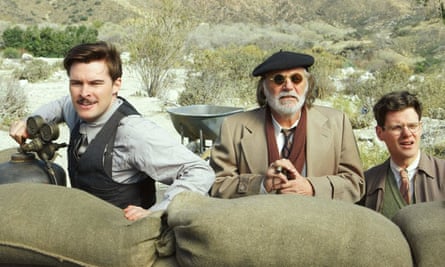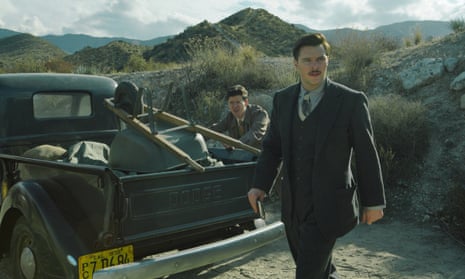Making a television show is grueling, expensive and time-consuming, but it isn’t rocket science. Sometimes, though, as Mark Heyman points out, it’s pretty darn close. Heyman is referring to Strange Angel, a new series about the bizarre life of Jack Parsons, known in aeronautical circles as the father of modern day rocketry and to others as the Thelemite occultist who crossed paths with self-proclaimed prophet Aleister Crowley and Scientology founder L Ron Hubbard. Parsons’ life has already inspired two biographies, a graphic novel, and an episode of Comedy Central’s Drunk History. Now it’s the basis for a splashy new drama from A Ghost Story director David Lowery, set in 1930s Los Angeles, where the spirits of American enterprise and new age mysticism are alive and well.
Those spirits converge, of course, in the ambitious, swaggering rocket engineer played by a mustachioed Jack Reynor. As the show begins, Parsons and his research partner Richard are trying to secure funding from California Institue of Technology (Caltech) for their studies on rocket propulsion. As it progresses, however, the plot sees him develop a fondness for ritualistic “sex magick” as part of a cult, making for an easily combustible series that mostly manages to rein in its own excesses.
“Either aspect of the story, whether it’s the birth of American rocketry or the world of underground, occult LA, was enormously challenging,” admits Heyman, who began developing the series after being sent George Pendle’s 2005 biography of Parsons four years ago. “They start out as fairly separate worlds, but as Jack starts to straddle them both, we see how his experiences in the occult influence his rocketry work and vice versa.”
Heyman, best known for co-writing Black Swan, felt a personal connection to the story, having been raised in New Mexico by hippie, new age parents in touch with their spirituality and the counterculture. Down the road from their home in the desert was the Los Alamos National Lab, the birthplace of the Manhattan Project, and Heyman’s best friend’s step-father was an acclaimed chemist.
“My childhood was in this weird intersection between science and mysticism,” he explains, “so when I read the biography of Jack Parsons it really struck a chord with me. And then, of course, there’s all these other fantastic elements to the story that weren’t a part of my childhood, like sex magick and L Ron Hubbard. So it was very much an immediate feeling of: ‘I need to be involved in this.’”
Over a four-month period, Strange Angel was developed at AMC, where Heyman put together a writer’s room and ended up with scripts for the first eight episodes. But AMC, which was already producing shows like The Terror and The Son, worried it had too many period pieces in the pipeline, so Strange Angel was shopped around before it landed at CBS All Access, the network’s subscription-based streaming service.
“It made a lot of sense,” says Heyman. “A story about a guy who was breaking new ground on a channel that was, likewise, starting to break new ground and reinvent themselves.”

Shortly after partnering with CBS, Heyman and showrunner David DiGilio brought on Lowery, whose credits also include Ain’t Them Bodies Saints and Pete’s Dragon. His sensibility, the pair explains, dovetailed closely with their intention of capturing both the occult underbelly and wide-eyed idealism of post-recession, pre-war Los Angeles.
“For me, all of David Lowery’s works are period pieces, and you don’t necessarily realize it because he’s so good at making it feel fresh and current, updating it in a way that doesn’t feel like an artifice filter,” says Heyman. “We didn’t want a sepia-toned, nostalgic look at the past.”
Production designer Warren Alan Young, DiGilio adds, “embraced the notion that LA was as much of an oil town as it was a Hollywood town”. As a result, the on-screen Parsons, charming but immodest, calls to mind The Aviator’s Howard Hughes and There Will Be Blood’s Daniel Plainview, themselves voracious, early 20th-century west coast entrepreneurs.

Parsons, who’d go on to create Nasa’s Jet Propulsion Lab, was eventually poached by local Thelemites, followers of the occult religion founded by Crowley. The “bacchanalian, polyamorous” cult, as Heyman describes them, practiced sex rituals that involved the consumption of blood, semen and feces, believing orgasms to be pathways to higher consciousness. Parsons himself was particularly preoccupied with making manifest “Babalon”, the female messiah who he believed would come to Earth and ride on the back of the “Big Beast”, Crowley.
Parsons’ integration into Thelema is stretched out over several unhurried episodes, but if Strange Angel occasionally plods along it’s only because the story needs time to gestate. Although their acquaintance isn’t featured in season one, Parsons will meet Hubbard, whose first wife Sara was the sister of Parsons’ first wife, played by Bella Heathcote. By the 1940s, Parsons was running Thelema’s California branch, consulting with Israel’s rocketry program and making an enemy of an American government subsumed in McCarthyist paranoia. In 1952, at the age of 37, Parsons died from injuries sustained in an explosion at his home laboratory.
“This brief moment of freedom and exploration is replaced by the military-industrial complex and the bifurcating of the world between communist Russia and the United States,” says Heyman, who plans to show these changes in upcoming seasons. “That transition from the Crowley cult into what becomes Scientology mirrors a greater transition in the world at large, from greater forms of freedom and self-exploration into power being consolidated into systems of control.”
In order to make Strange Angel accurate and accessible, Heyman and DiGilio included astrophysicists and chemists from Caltech in the writer’s room. But a rocket launch, they explain, might be better understood as a metaphor for Parsons himself. “A rocket is a very controlled explosion,” Heyman says. “You need a combustible part, but that explosion is always threatening to rip apart the whole thing. That idea, of someone trying to balance their explosive side with the side that needs to keep focus and in control, is the most fascinating aspect of the show to me.”
- Strange Angel starts on CBS All Access on 14 June with a UK date yet to be announced

Comments (…)
Sign in or create your Guardian account to join the discussion